Theme:
Co-creation of New Urban Living:
Advancing Quality of Life in the Climate Change Era
Venue: Jakarta/Surabaya, Indonesia
Date: Oct 20-28, 2024
Photo by Jimmy A. Domingo
Call for applications for the 48th seminar is closed. Click here to visit the seminar website.
Theme:
Co-creation of New Urban Living:
Advancing Quality of Life in the Climate Change Era
Venue: Jakarta/Surabaya, Indonesia
Date: Oct 20-28, 2024
| Date | Theme | Country | Poster | |
|---|---|---|---|---|
| 47th | 2023.12.7- 2023.12.14 |
Health, Border, and Marginality: Toward Transdisciplinarity?? | Thailand |
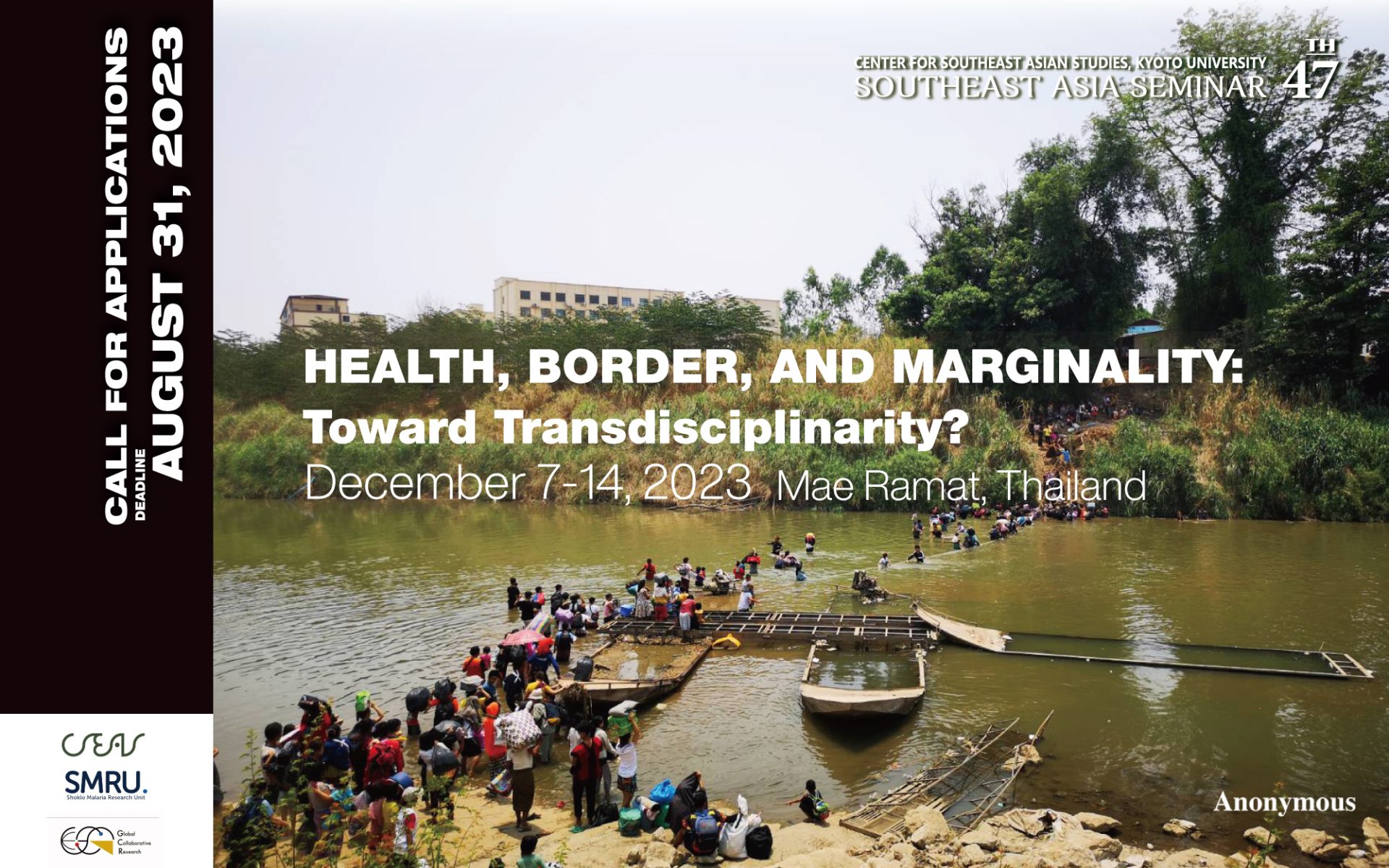
|
| 46TH | 2023.2.16 | Social Media and Youths in Southeast Asia: An Instrument for Political Change? | Kyoto/Online |
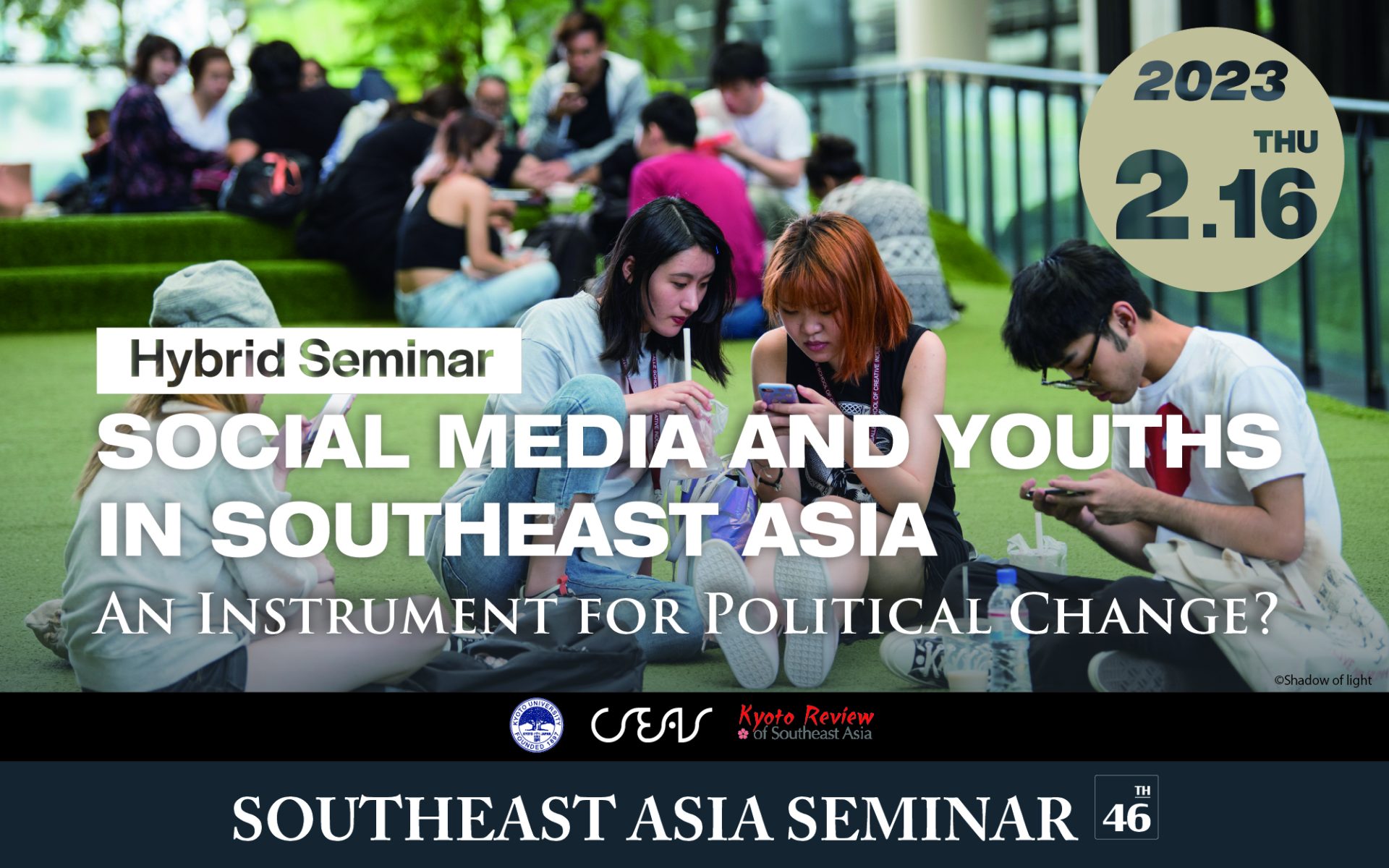
|
| 45TH | 2022.2.18- 2022.2.19 |
Engaging Transdisciplinarity: Variegated Trajectories in Southeast Asian Studies | Online |
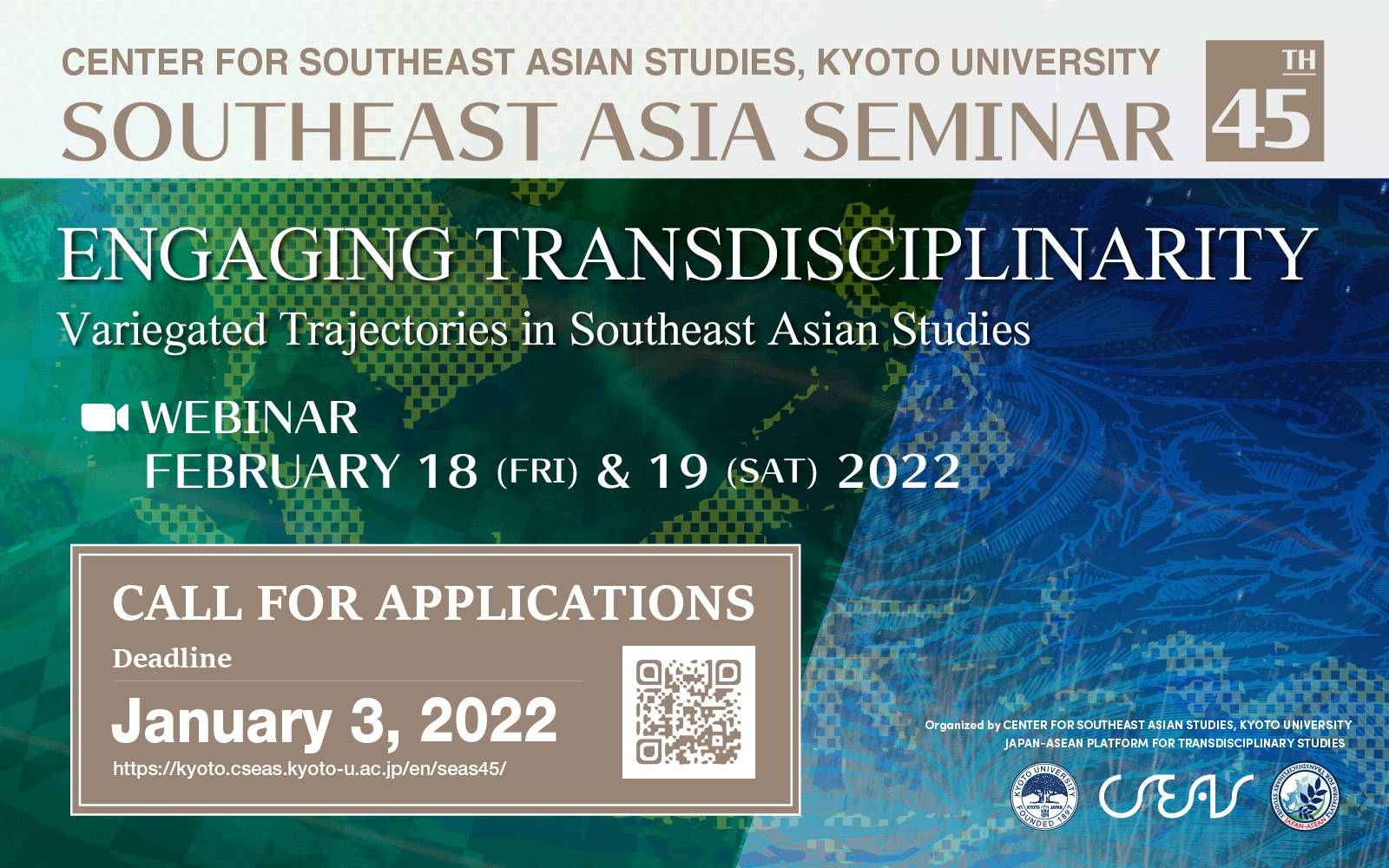
|
| 44th | 2021.3.1- 2021.3.2 |
The Covid-19 Pandemic in Japanese and Southeast Asian Perspective: Histories, States, Markets, Societies | Online |
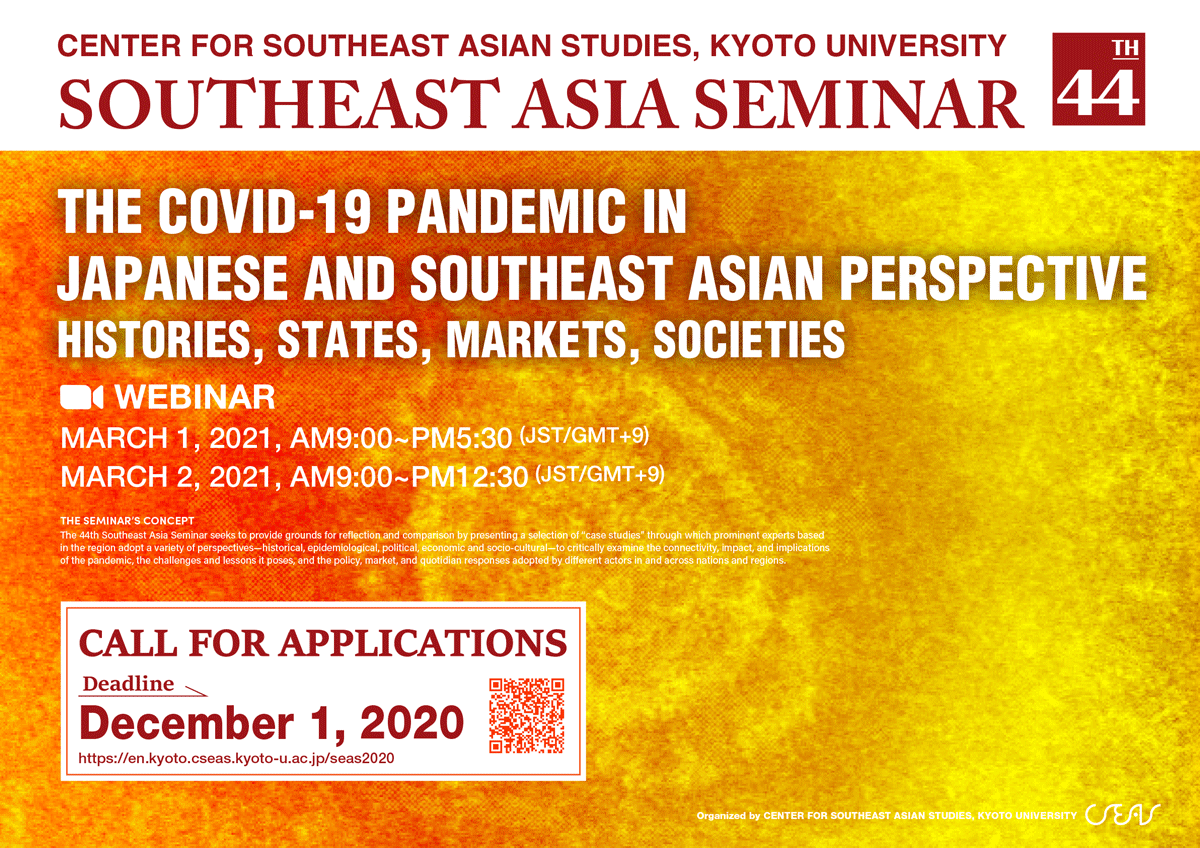
|
| 43rd | 2019.11.07- 2019.11.13 |
Economic Growth, Ecology, and Equality: Learning from Vietnam | Vietnam |
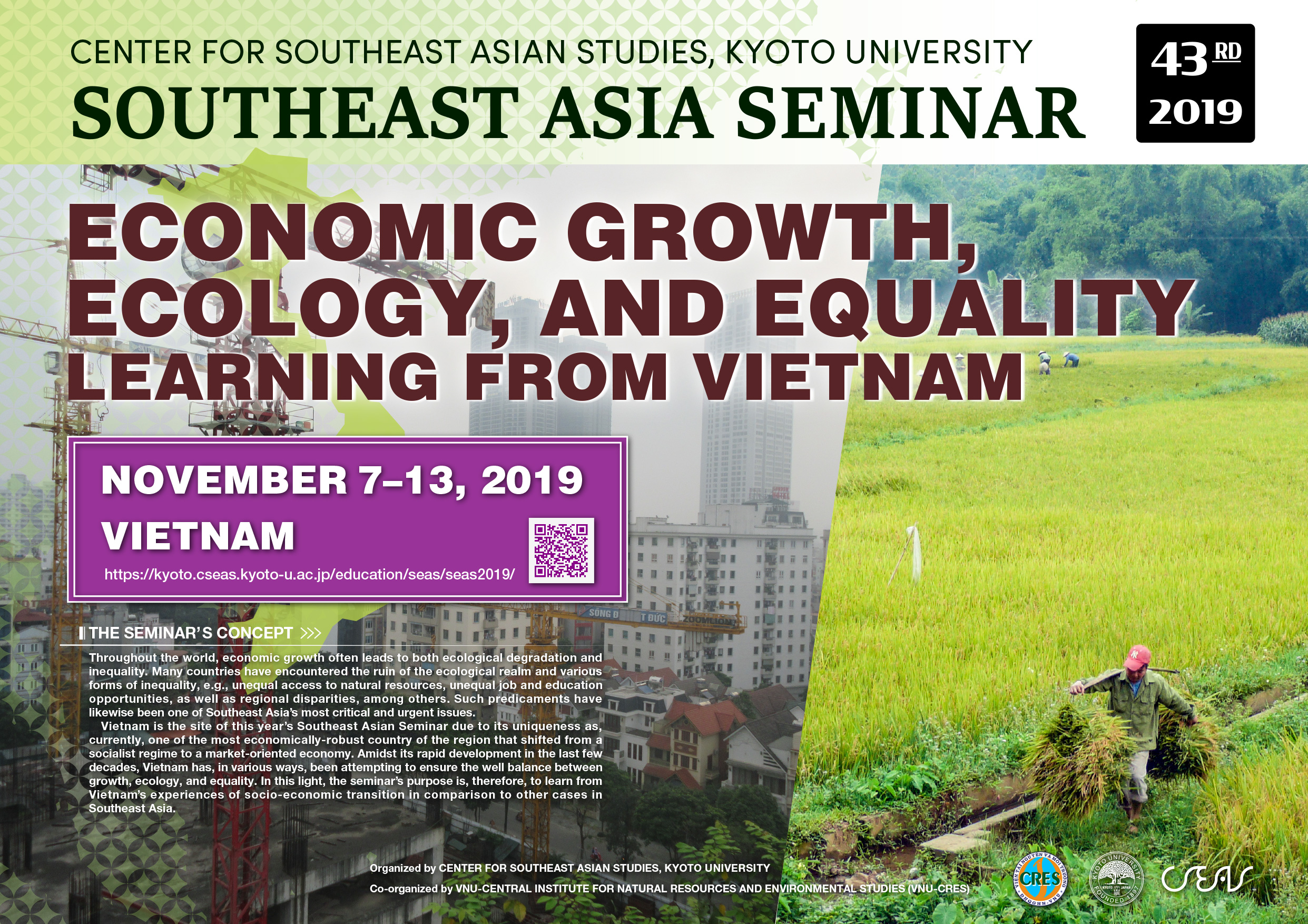
|
| 42nd | 2018.12.06- 2018.12.12 |
Health and Rural Development Based on the Concept of Gross National Happiness | Bhutan |
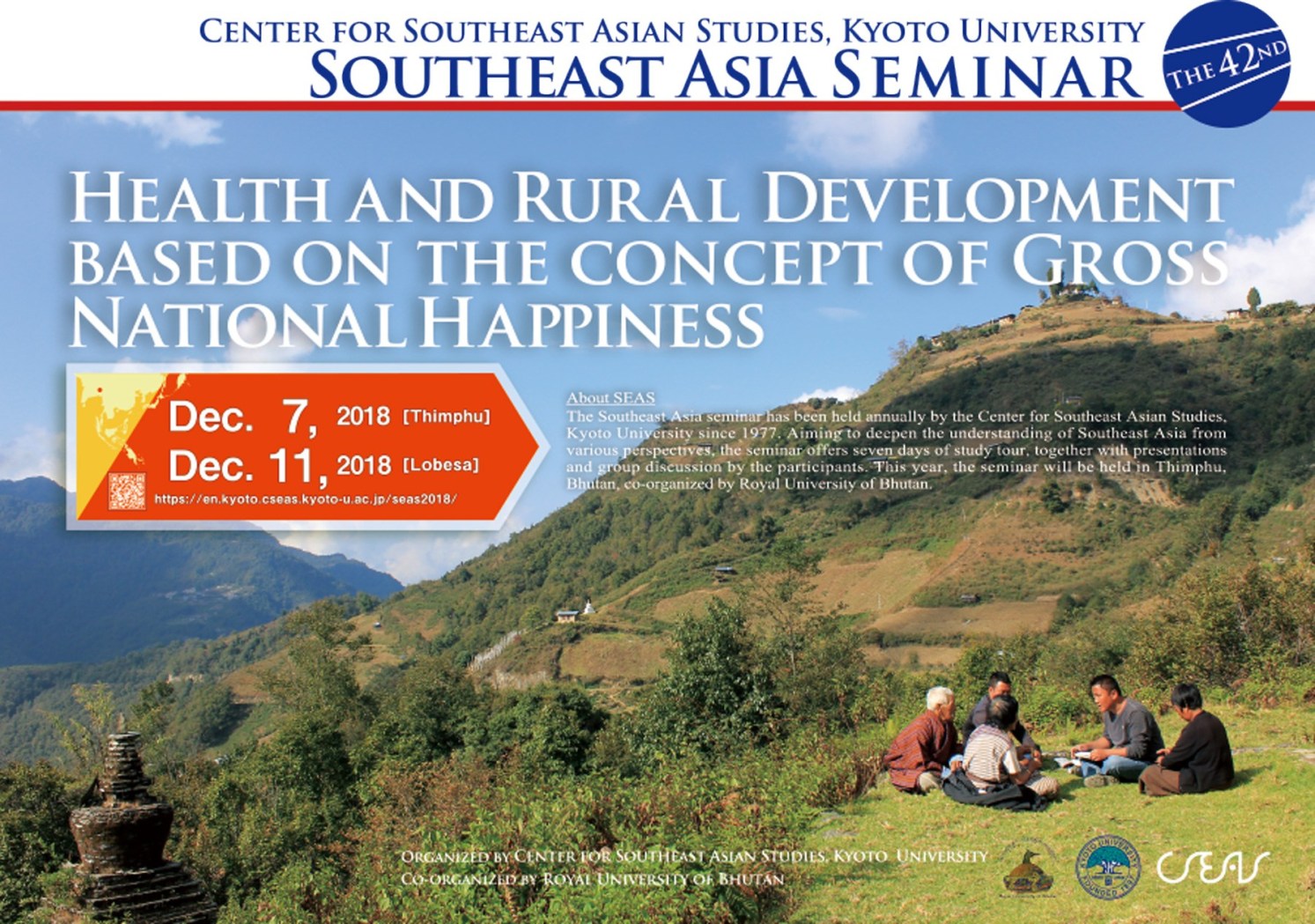
|
| 41st | 2017.11.02- 2017.11.07 |
Economic Development in Laos and the Greater Mekong Region | Laos |

|
| 40th | 2016.11.19- 2016.11.22 |
The Promise and Challenge of Democracy in 21st Century Southeast Asia | Myanmar |
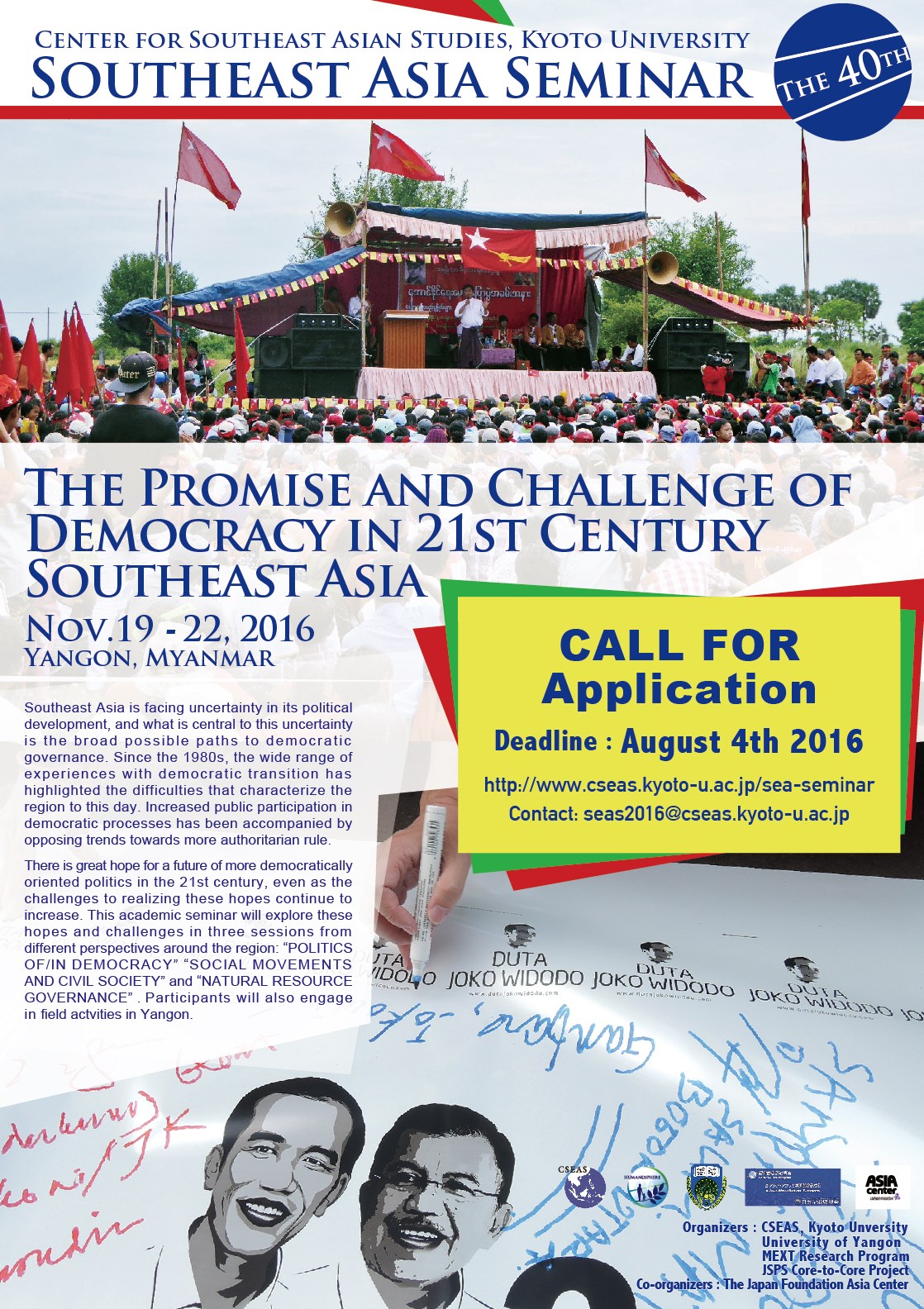
|
| 39th | 2016.01.25- 2016.01.30 |
Mapping the Aesthetics of Urban Life in Asian Cities: A Dialogue with the Arts | Japan |
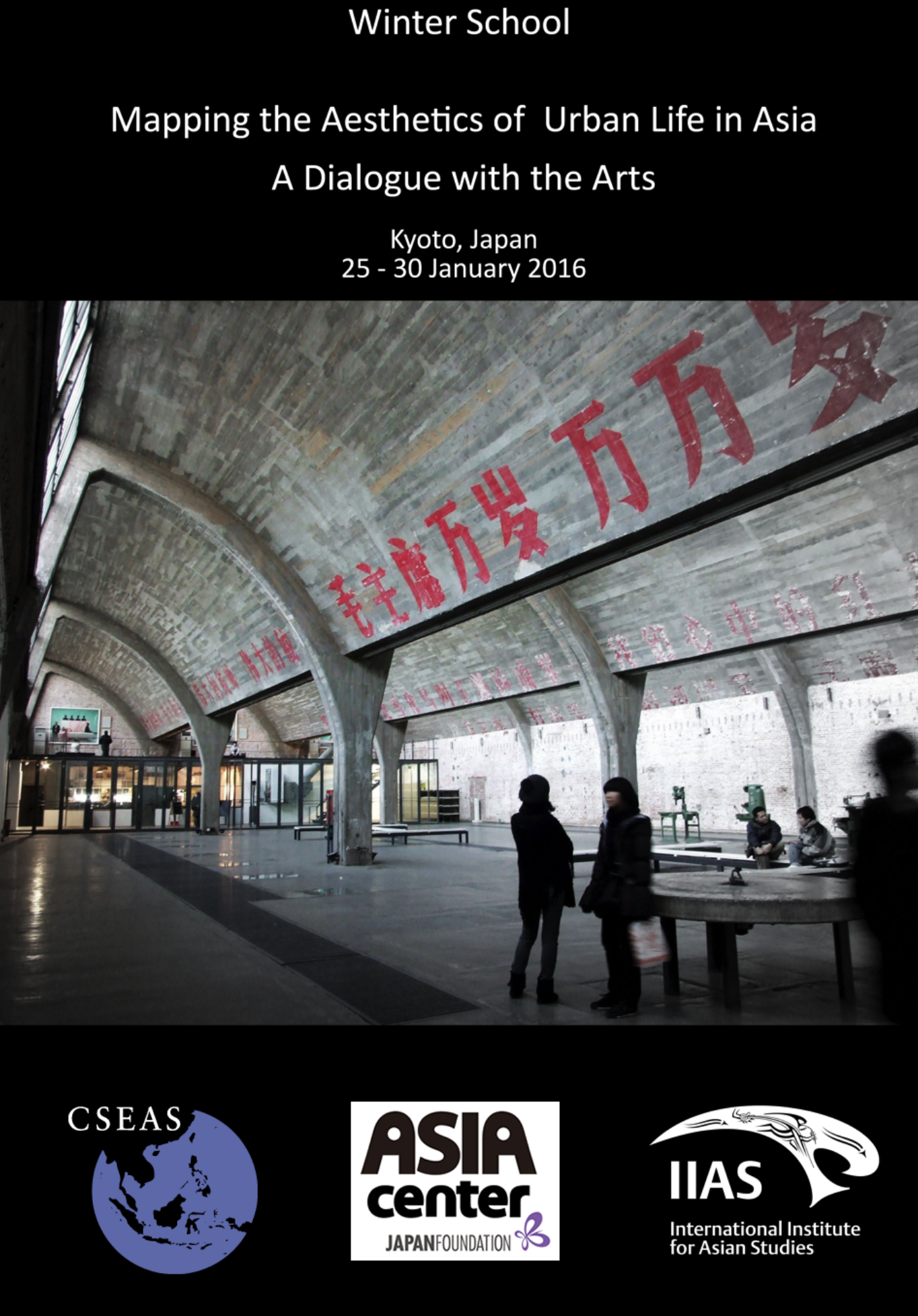
|
| 38th | 2014.11.22- 2014.11.25 |
Connectivity in Southeast Asia: Multidisciplinary approaches to understanding global transformations | Cambodia |
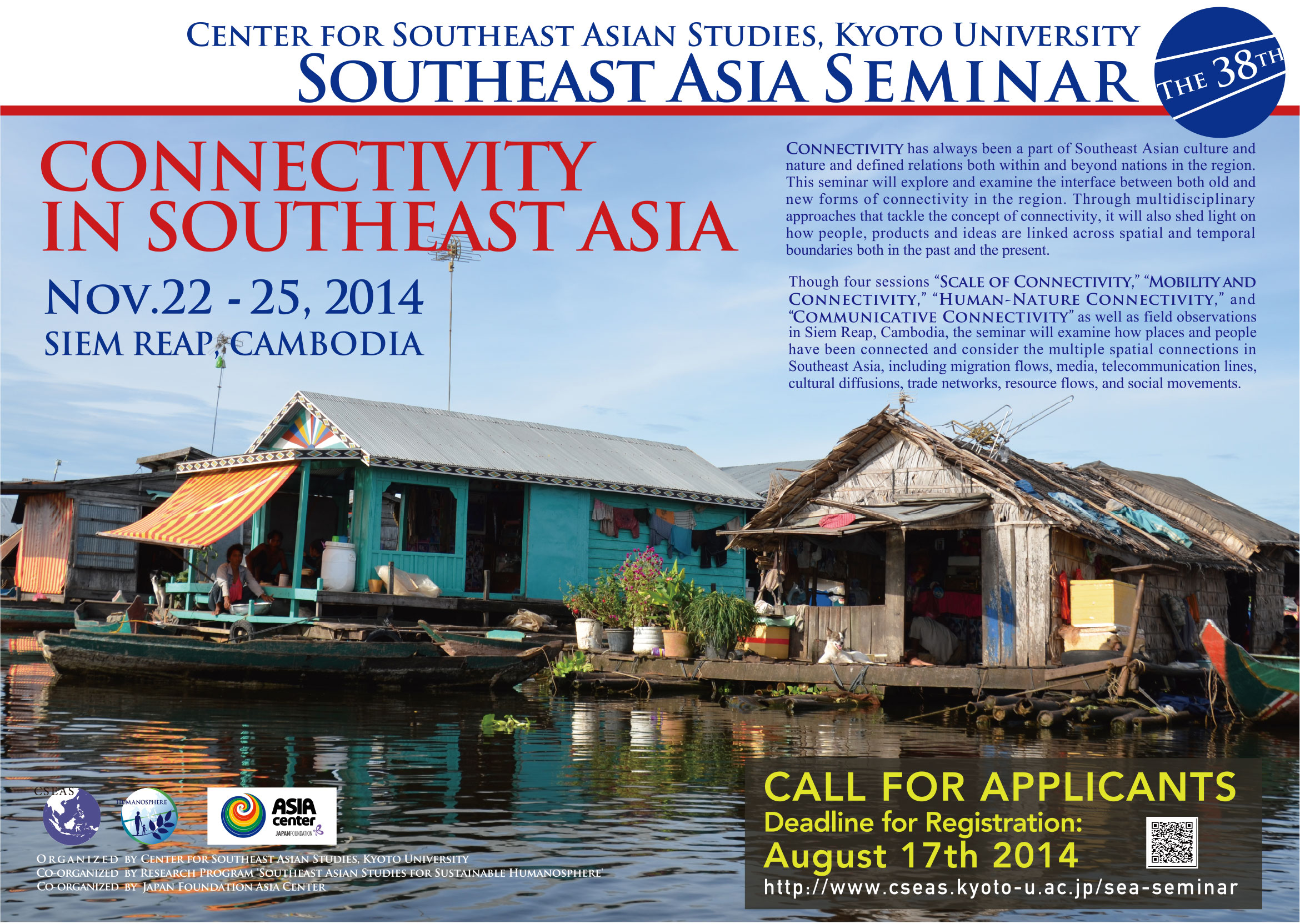
|
| 37th | 2013.10.29- 2013.10.31 |
EHuman-Nature Interactions in Southeast Asia:Trans-disciplinary Approaches | Malaysia |

|
| 36th | 2012.11.20- 2012.11.29 |
Cities and Cultures in Southeast Asia | Philippines |
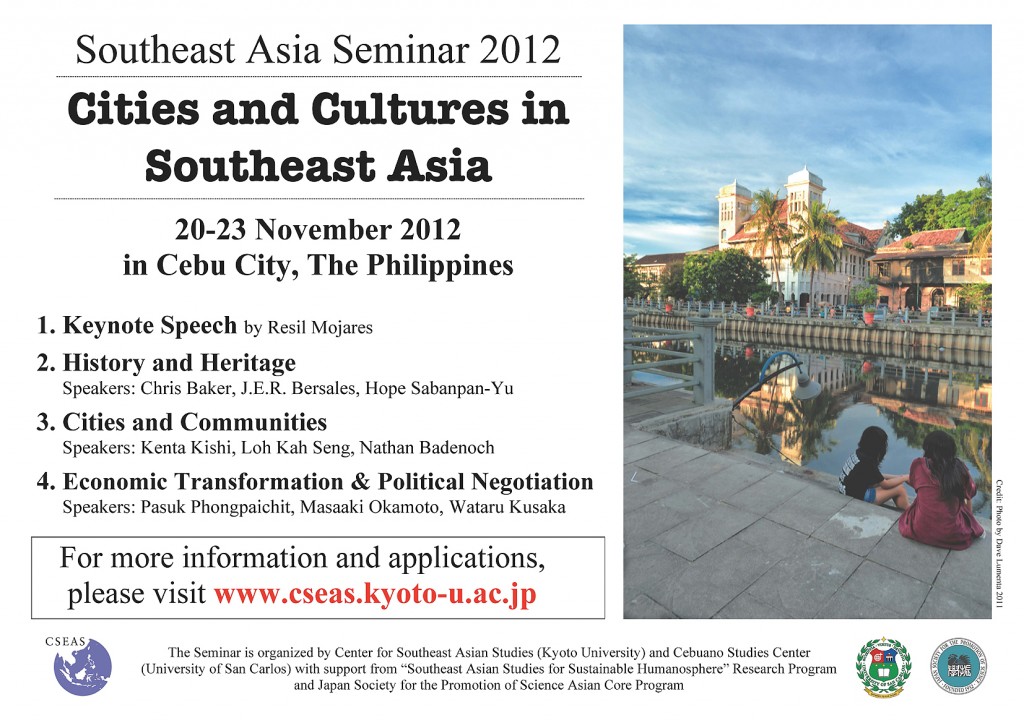
|
| 35th | 2011.11.22- 2011.11.25 |
The Transformations of Human Landscape in Southeast Asia | Thailand |
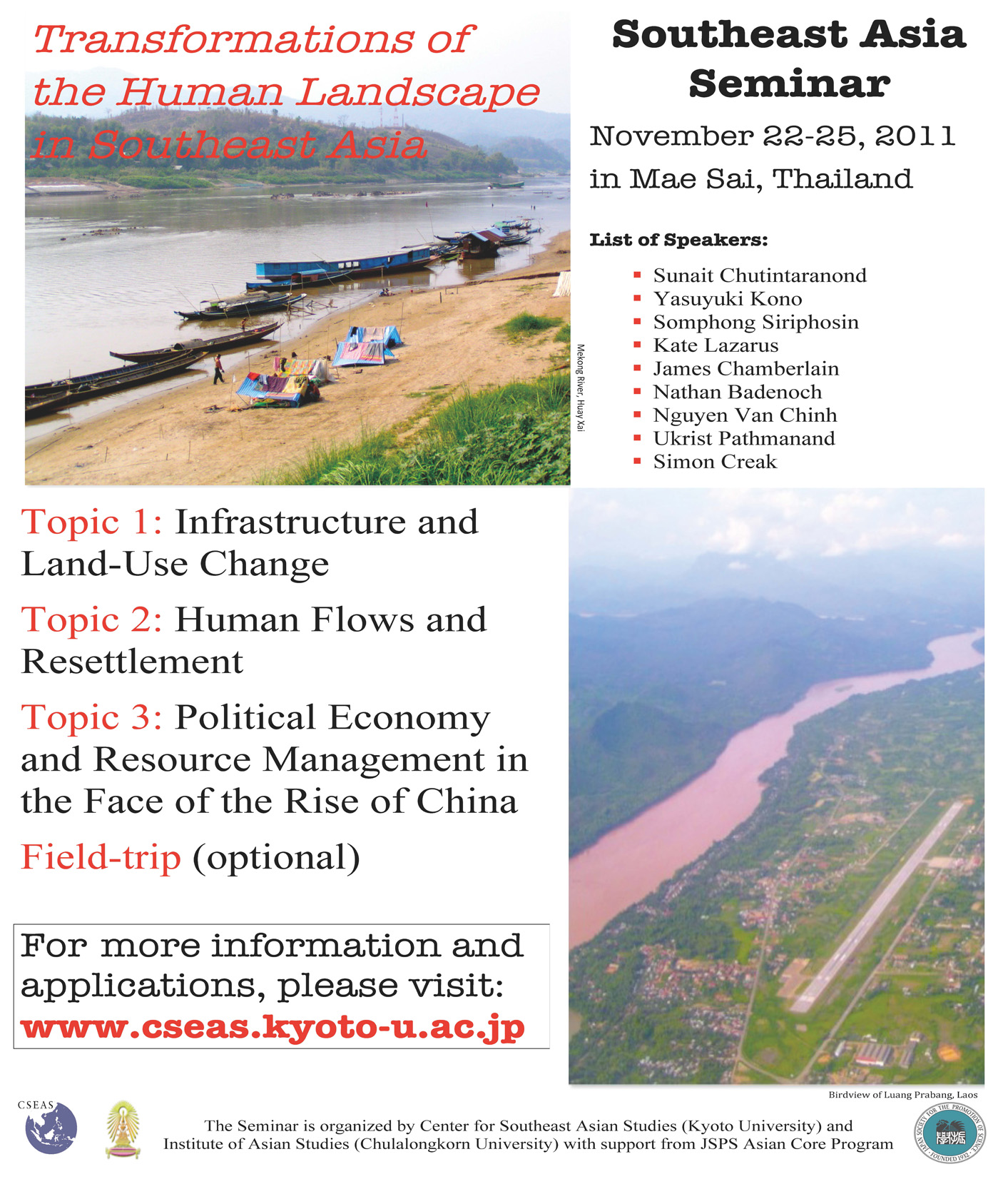
|
| 34th | 2010.10.20- 2010.10.23 |
New Concept Building for Sustainable Humanosphere and Society from the Equatorial Zone of Southeast Asia | Indonesia |

|
| 33rd | 2009.09.7- 2009.09.11 |
“Region” and Regional Perspectives on/from Southeast Asia | Japan |
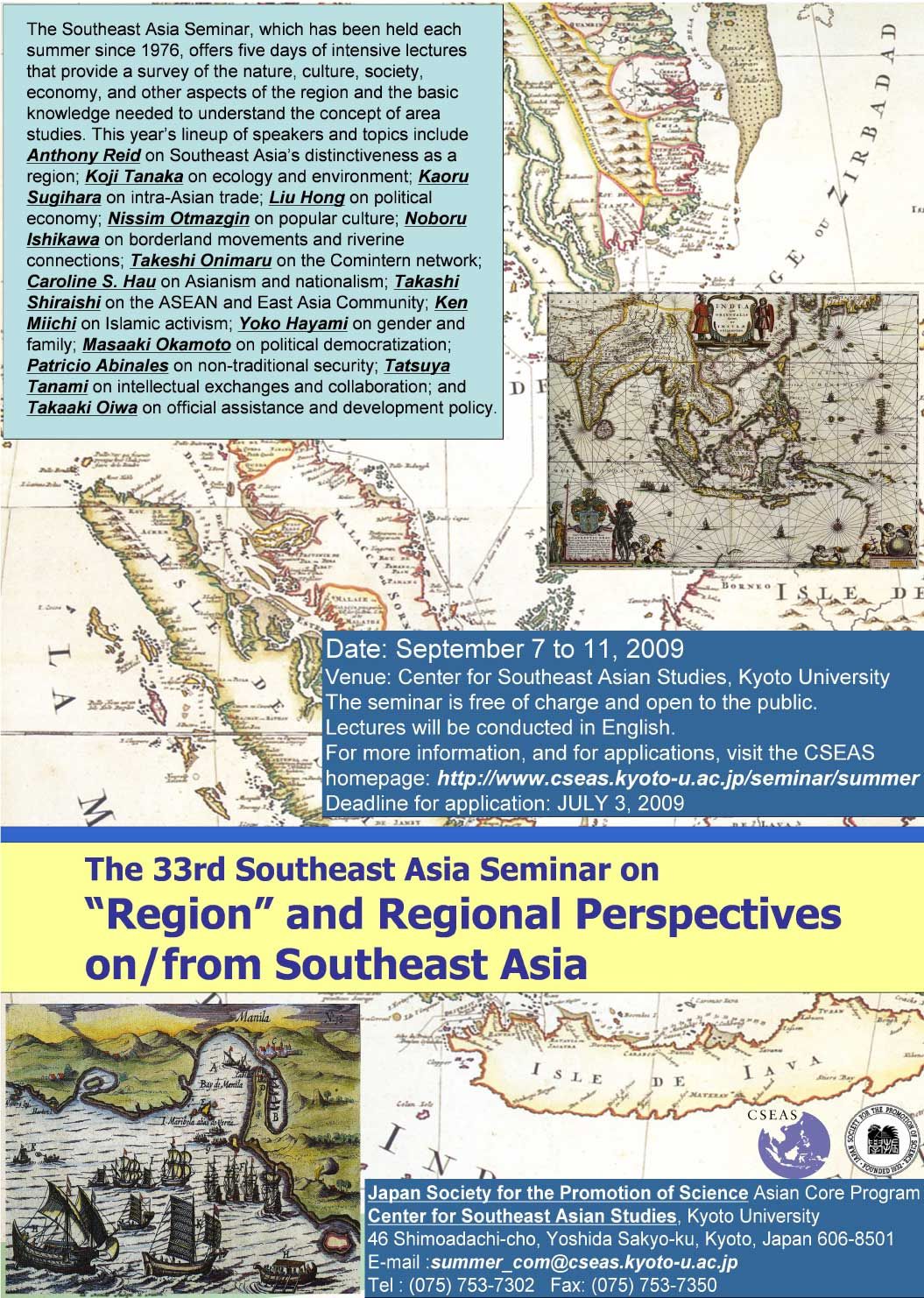
|
| 32nd | 2008.09.1- 2008.09.5 |
Southeast Asia: Light and Shadow | Japan |
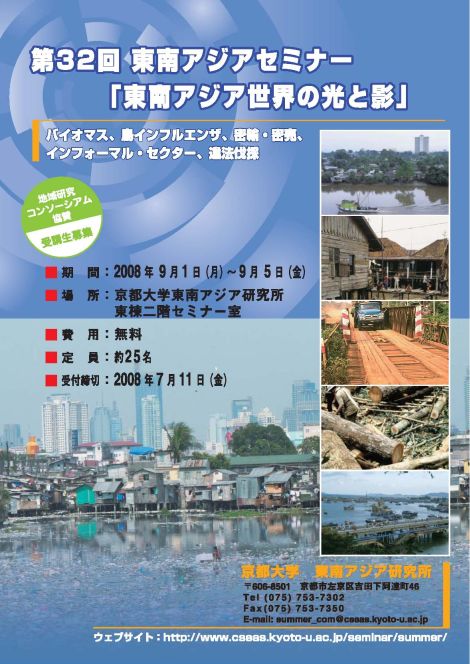
|
| 31st | 2007.09.3- 2007.09.7 |
Area Studies and Geographic Information Science: Observing, Analyzing and Relating the Time and Space of a Region | Japan |
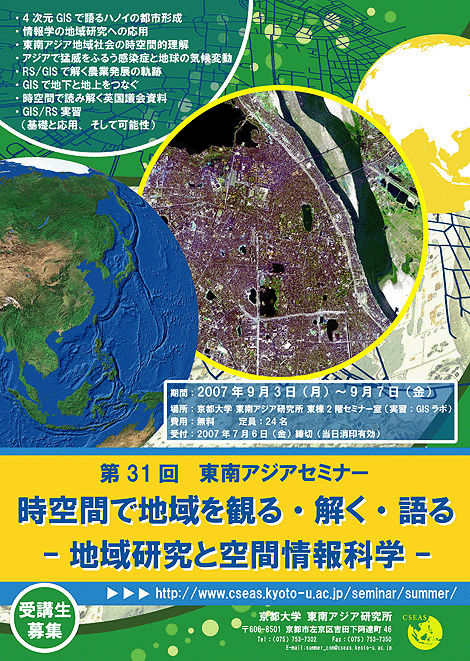
|
| 30th | 2006.09.4- 2006.09.8 |
Areas Studies in Sites of “Development”: Environment, Poverty and Practice | Japan |
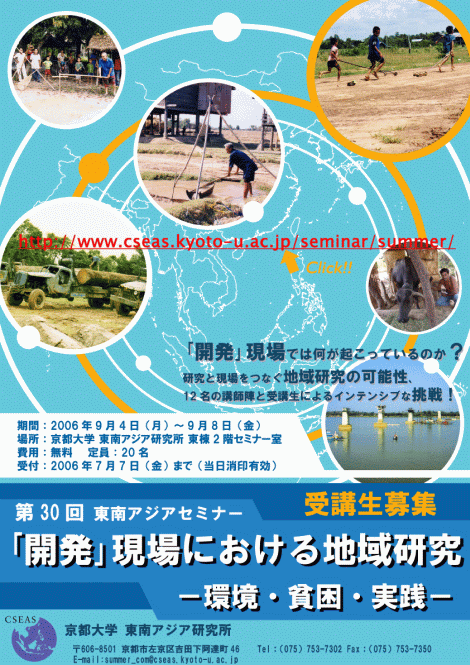
|
| 29th | 2005.09.5- 2005.09.7 |
Beyond Southeast Asia: The Frontier of Chinese and Overseas Chinese Studies | Japan | |
| 28th | 2004.09.6- 2004.09.10 |
Engaging with the Field, Contributing to the Field: Diverse Approaches to Area Studies | Japan | |
| 27th | 2003.09.1- 2003.09.5 |
Opening Mainland Southeast Asia: The Many Aspects of Market Economy Transformations | Japan | |
| 26th | 2002.09.9- 2002.09.13 |
Life, Ageing, Sickness and Death in Southeast Asia: Perspectives from the Field | Japan | |
| 25th | 2001.09.3- 2001.09.7 |
The Kaleidoscope of Southeast Asian History: Welcoming the 21st Century | Japan | |
| 24th | 2000.09.4- 2000.09.08 |
20th Century Southeast Asia: Trajectories and Prospects | Japan | |
| 23rd | 1999.09.6- 1999.09.10 |
Area Studies and Geographic Information: Fieldwork with Remote Sensing and GIS | Japan | |
| 22nd | 1998.10.26- 1998.10.30 |
The “Crisis” of the Southeast Asian Economy: Catalyst of Reform? | Japan | |
| 21st | 1997.09.26- 1997.09.27 1997.10.23-1997.11.6 |
Southeast Asia after the Era of Borders: From Vientiane to Singapore | Japan Laos/Thailand/Malaysia/Singapore |
|
| 20th | 1996.09.2- 1996.09.6 |
The Many Forms of Rural Development | Japan | |
| 19th | 1995.9.4- 1995.9.8 |
Southeast Asia from the Perspective of Human Formation | Japan | |
| 18th | 1994.9.5- 1994.9.9 |
Southeast Asia and Human Existence | Japan | |
| 17th | 1993.8.30- 1993.9.3 |
Area Studies Methods: From the Practice of Southeast Asian Studies | Japan | |
| 16th | 1992.8.31- 1992.9.5 |
Area Studies Methods: From the Practice of Southeast Asian Studies | Japan | |
| 15th | 1991.9.2- 1991.9.7 |
Southeast Asian Perspective on Nature, Development and Culture | Japan | |
| 14th | 1990.7.9- 1990.7.14 |
Considering the Thai Economy: A View from Thailand | Japan | |
| 13th | 1989.7.3- 1989.7.15 |
Southeast Asia as Marine Region: The Foundations of the Maritime World, Formation and Development of the Maritime World, Marine Regions and the Present | Japan | |
| 12th | 1988.7.4- 1988.7.17 |
Southeast Asia as a Frontier | Japan/Thailand | |
| 11th | 1987.7.13- 1987.7.25 |
Politics and Revolution in the Southeast Asian World | Japan | |
| 10th | 1986.7.7- 1986.7.19 |
Approaches to the Southeast Asia World | Japan | |
| 9th | 1985.7.1- 1985.7.13 |
The Malay World | Japan | |
| 8th | 1984.7.16- 1984.7.28 |
Southeast Asian Economics from a North-South Perspectives | Japan | |
| 7th | 1983.7.11- 1983.7.23 |
Agriculture in Southeast Asia | Japan | |
| 6th | 1982.7.19- 1982.7.31 |
The Mainland Southeast Asian World | Japan | |
| 5th | 1981.7.17- 1981.7.30 |
Indonesia and the Archipelagic World | Japan | |
| 4th | 1980.7.18- 1980.7.31 |
Natural Foundations of Southeast Asian Agriculture/ The Mind and Beauty of Southeast Asia/ Politics and Economy of Southeast Asia | Japan | |
| 3rd | 1979.8.1- 1979.8.16 |
Language and History/ Nature and Agriculture/ Politics and Economics/ Ethnicity and Culture | Japan | |
| 2nd | 1978.8.16- 1978.8.31 |
Nature, Culture and Society in Southeast Asia | Japan | |
| 1st | 1977.8.5- 1977.8.29 |
Rice-Producing Southeast Asia: Myrdal’s Asia, Environment and Rice Production in Southeast Asia | Japan |